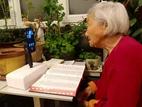Illness and death are unavoidable issues in every person's life. In today's society, where palliative care is still not widely understood or practiced, many Christians also face the tension between faith and reality: When they or their loved ones approach the end of life due to illness, what does faith mean? How can they face such trials with a spiritual perspective and achieve peace in both life and death?
Members of a palliative care fellowship in a church in northern China are also seeking answers to these questions. Founded by a breast cancer survivor, this compassionate fellowship offers spiritual support and comfort to those in crisis through their experiences. In the process, the volunteers have better understood what palliative care entails and the precious value of life itself.
Building a Fellowship in Suffering
More than 20 years ago, Sister W (pseudonym), a co-founder of the fellowship, experienced a long and painful battle with breast cancer before being healed. This experience gave her deep empathy for others in similar situations and a desire to bring hope to those struggling with illness. She and a few sisters in the church who had been through similar experiences formed a small support group to study the Bible, pray, and encourage each other. They visited and cared for patients, using their testimonies to inspire others to rely on Christ in hardship.
Initially, the group had only a dozen members, but as word spread, more and more people with serious illnesses and their families were drawn in. From liver, stomach, and esophageal cancer to ALS and genetic diseases, the fellowship's care extended to an increasingly diverse group of patients.
Recognizing the growing and urgent need for care, the church's senior pastor encouraged W to expand the ministry's scope and impact, sharing the gospel through love and influencing lives through their own. She embraced this vision, which later became the core mission of the newly established fellowship. In 2013, with full support from the church, a ministry offering holistic care for terminally ill patients was officially launched.
A Challenging Path
Even before the fellowship's formal establishment, Sister W and a group of dedicated volunteers were already actively involved in visits. After the fellowship was formed, more non-Christian families of patients also came seeking help, and more volunteers joined the ministry.
However, caring for those with terminal illness is no easy task. Over the years, many joined the ministry, but many also left. Sister F, a longtime volunteer, explained that the high turnover wasn't due to a lack of love or compassion, but rather the overwhelming sense of helplessness people feel when faced with severe illness. Many volunteers, being cancer patients or survivors themselves, were initially able to deeply connect with others who shared similar experiences. But as more patients with rare and unfamiliar diseases came into the fellowship, volunteers realized the limitations of their ability to empathize or help.
Encounters with patients suffering from rare conditions deeply impacted many of the volunteers, highlighting their human limitations. After prayer and discussion, the fellowship decided to narrow its focus to patients with cancer, especially those in critical or terminal stages, to provide more effective care.
Sister F noted that while they wished to help everyone, what mattered more was whether their service bore real fruit. "We don't want to spread ourselves too thin and end up helping no one well," she said.
Influencing Lives with Life
In its early days, the fellowship operated as a spontaneous support group where volunteers served as they felt led. While this approach yielded many touching stories, both the church leaders and Sister W sensed something was missing. She explained that the volunteers were full of love and dedication, even willing to rush to hospitals at any hour. However, over time, it became clear that emotional support and basic care were not enough—true palliative care needed to address the whole person: body, mind, and spirit.
She recalled one particular visit to a young woman in her twenties who was in the final stages of cancer. The sight of such a vibrant life fading away overwhelmed many volunteers, who broke down in tears and had to leave the room, interrupting the visit. This experience made it clear that emotions alone could not sustain this ministry. True care requires greater professionalism and total dependence on God to provide deep spiritual comfort and healing.
With support and guidance from the church pastors, the volunteers began to take courses on hospice care from both domestic and international sources. Through their training, they learned how to enter into patients' inner worlds, help them reframe their sense of value and relationships at the end of life, and apply practical caregiving principles. The church also offered an ethics course rooted in spiritual principles to equip frontline volunteers.
Sister F shared that they used to try to comfort patients by talking a lot, but pastors reminded them that listening is often more important than speaking. Only by listening can volunteers truly understand a patient's heart and spiritual needs, which allows them to offer real healing and comfort.
Several years ago, the fellowship cared for a young woman during the final 40 days of her life. Volunteers took turns listening to her thoughts and wishes, praying constantly, and walking with her through her final moments. They also helped plan her memorial and continued to support her family afterward. Sister W said the team hoped that through their service, patients and families would experience real, faithful love and know they are not alone.
This love, she added, also brought transformation. The young woman's father eventually came to faith and joined the volunteer team himself.
Cultivating Love with Boundaries
Through years of service, Sister W came to realize that volunteers also need spiritual care. While compassion is a virtue, she noted that without healthy boundaries, it can become a heavy burden.
As fellow travelers through suffering, volunteers often develop deep emotional bonds with patients. This sometimes leads them to take on excessive responsibility, trying to help with treatments or raise funds. Over time, such burdens can lead to emotional exhaustion and even breakdown. That's why Sister W emphasizes the importance of recognizing boundaries: "When you leave the hospital room, you return to your own life." This isn't about coldness or indifference, but about practicing wise and sustainable spiritual self-care.
"We are not God," she said. "We cannot fulfill every wish of the patients or those we love. What we can do is walk with them as much as we can, be a channel leading them to Jesus, and find true release in surrendering to Him."
Life Is in God's Hands
Looking back over the past decade, the two sisters have accompanied countless lives on hospital beds—and bid farewell to many beloved souls. Yet instead of leaving shadows in their hearts, these experiences have deepened their joy and transformed their understanding of life.
Sister W shared that while they always hoped for miracles, even when the outcomes didn't align with their desires, they could still see God's love and work in each life. Some patients who once longed for death found renewal through the fellowship. A few were even baptized in their hospital beds and became messengers of the gospel in terminal wards.
From her perspective, while terminal illness may seem like a road of despair to most, Jesus sees it differently, like when he raised Lazarus. Through his eyes, these moments are filled with heavenly hope. "Not only are these patients saved, but they also become blessings to others. What is there to fear or worry about?" she asked.
As for the future, they have no grand plans—but their calling has only become clearer. "God gave us the mission of accompanying people on their final mile," they said. "So we walk that last mile with unwavering faith and hope, until we see our Father in heaven."
Originally published by the Gospel Times
- Edited and translated by Katherine Guo












